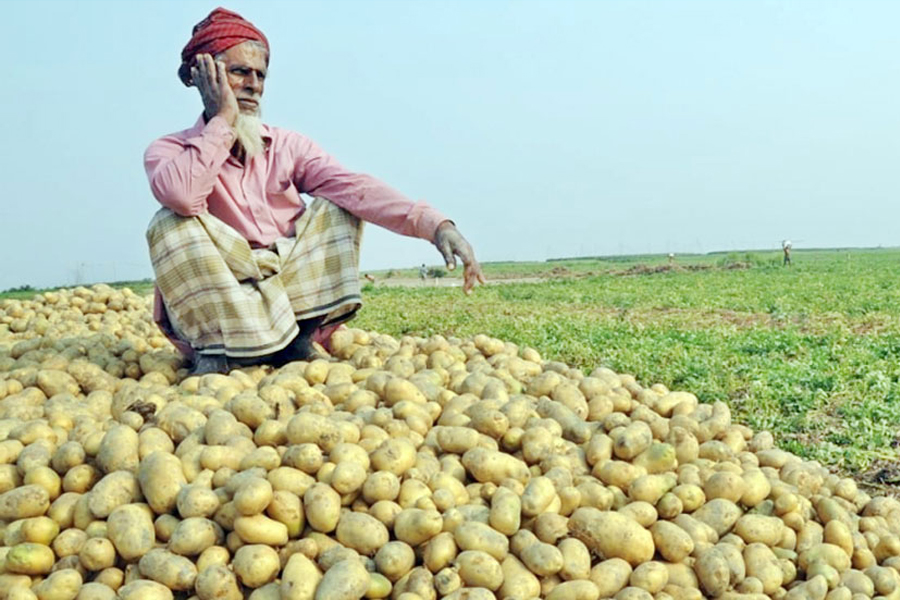
Published :
Updated :

The alluvial soil of Bangladesh is so fertile and abundant in fresh water that it sustains more than 160 million people. However, with such a dense population comes the need for housing and urban expansion, which is pushing the boundaries of cities and towns. An inevitable outcome of this is the continuous shrinking of agricultural land. The most recent agricultural census held in 2019 revealed an alarming extent at which agricultural land is disappearing, with an annual loss rate of 0.21%. As available land continues to shrink, the country is left searching for ways to boost production on the limited area it has.
The steady decline in cultivable land has significantly increased the country's reliance on imported agricultural and food products. A 2023 FAO report confirmed that Bangladesh now ranks as the third-largest global food importer, which has put substantial pressure on its already dwindling foreign currency reserves. Under the circumstances, farmers should have received every conceivable support in production and marketing so they feel encouraged to increase the quantity of their produce. But what actually happens is that many farmers today, without adequate backing in areas they need most, routinely struggle to recover even their production costs.
Not knowing the potential profits from their crop yields, farmers in Bangladesh often hesitate to decide which crops to cultivate. Frequently they opt for crops that were in high demand the previous year. However, when a large number of farmers simultaneously choose the same crop, the resulting surge in production leads to overproduction, causing a subsequent decline in market prices. This very pattern has played out this season with potatoes, onions, and tomatoes. Hoping for prices similar to the previous year, many farmers went for these crops at the same time and now they are unable to sell them for even recovering their investment in cultivation.
While urban consumers enjoy the low prices of potatoes, onions, and tomatoes, the prospects are looking bleak for farmers. A kilogram of potatoes, which cost Tk 18-20 to grow, sells for Tk 10-12 at wholesale markets. Onions, requiring Tk 38-41 per kilogram to cultivate, sells for barely Tk 22-25. Tomatoes and green chilies are also going for less than their production cost. It's a crisis that's forcing many farmers into debt. The unfortunate reality is that the very people responsible for feeding the nation are now struggling to put food on their own tables.
Rather than offering help, middlemen, brokers, and powerful corporate circles are exploiting this suffering. While farmers toil in the fields from sunrise to sunset, these intermediaries reap the real rewards from their labour. The commercialisation of agriculture should have brought prosperity to those who cultivate the land, but more often than not, it has done the opposite. The prices of seeds, fertilizers, pesticides, and labour have steadily climbed, while the payments they receive remain volatile, if not inadequate. Contributing to this crisis is the decline in agricultural loan disbursement. The central bank set a disbursement target of Tk 380 billion for the 2024-25 fiscal year, but only 34 per cent was reportedly disbursed in the first five months, which is a 14.39 per cent decrease from the previous year. Banks claim financial struggles as the reason for reduced agricultural loan disbursement, but the truth is they prioritise corporate clients over struggling farmers.
One of the root causes of this crisis is oversupply. Encouraged by last year's price surges, farmers this year expanded their potato cultivation by 15 per cent and onion fields by 8.0 per cent. They did this in the absence of effective guidance on crop diversification and planting schedules and ultimately had to sell their produces, no matter how low the price. While the Department of Agricultural Extension (DAE) has an office in each upazila to assist farmers in making informed decisions, the oversupply of several crops indicates that they did nothing.
If there had been enough cold storage, farmers wouldn't be in this situation, but there simply aren't enough of the cold storage. On the one hand, the number of storage units is far below what's needed in key farming regions, and on the other hand, many cold storage owners are reportedly refusing to store farmers' crops such as potatoes at the government-fixed rental rates. Some have pre-issued storage slips to themselves, their relatives and acquaintances to falsely claim their storage is full. Meanwhile, powerful traders and storage owners hoard produce, waiting for prices to rise so they can cash in. Farmers take all the risks while others reap the rewards.
The solution to this problem should start with better storage. The government could finance construction of solar-powered storage facilities, similar to those used in other countries, in key agricultural areas to make storage more affordable and accessible there. Storage rates need fair regulation to avoid exploitation, and, at the same time, traditional low-cost solutions for storage can be reintroduced to help small farmers keep their produce fresh without relying on costly facilities.
Farmers also require greater access to information. The officials at DAE can be utilised to provide real-time market data, recommend alternative crops based on market demand, connect farmers directly to buyers, or connect them with food processing industries that, for example, convert potatoes into chips, tomatoes into sauces and pineapples into juices. This could be achieved by developing mobile applications that make such information readily available. At the same time, restricting imports-for example, limiting onion imports during local harvests-could help stabilise domestic pricing and keep producers from being outbid by cheaper overseas alternatives.
Right now, consumers are enjoying low prices on some produces, but this may come at a high long-term cost. If farming remains unprofitable, farmers are bound to forsake the profession at some point. That would be an issue not only for farmers, but for everyone.
shoeb434@gmail.com


 For all latest news, follow The Financial Express Google News channel.
For all latest news, follow The Financial Express Google News channel.